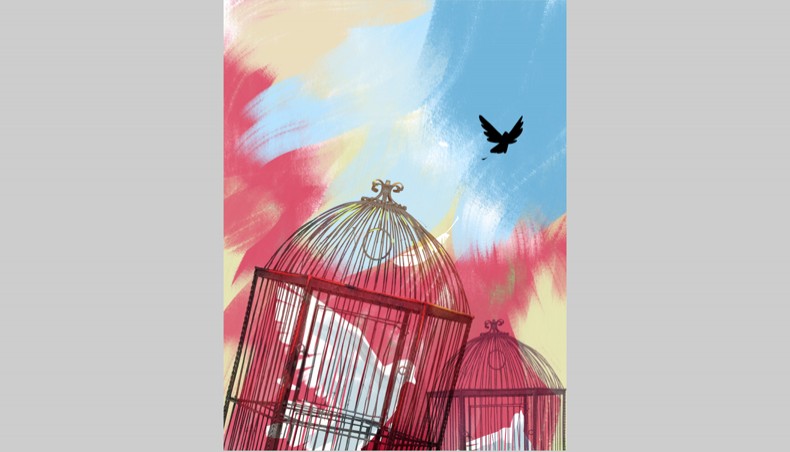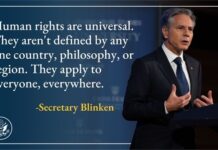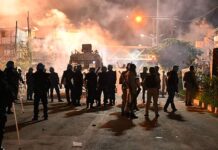
WHILE Bangladesh is set to celebrate the 53rd anniversary of national independence, India that helped Bangladeshis achieve the independence through a bloodied war against the erstwhile occupation forces of Pakistan appears to have emerged as a political villain in the eyes of most Bangladeshis because of Delhi’s repeated interference with Bangladesh politics, resulting particularly in disfranchising the people of Bangladesh since the general elections held in 2008.
The recently launched ‘boycott Indian products’ movement, initiated and nurtured by a cross section of young Bangladeshi netizens at home and abroad, definitely in reaction to India’s hegemonic attitude towards Bangladesh, has visibly started to gain social momentum in the country, posing a significant threat to the Indian economy. India, after all, officially exports to Bangladesh its products worth as much as $13 billion every year while its unofficial exports through the long, porous border remain more than double the amount.
The emerging situation, however, might help the Indian establishments concerned to start some soul-searching about its hegemonic attitude, political and otherwise, towards Bangladesh.
It should have been all-out friendly
BANGLADESH’S war of independence began with the then West Pakistani rulers refusing to honour the electoral mandate to hand over power to the East-based Awami League that unambiguously won Pakistan’s first ever general elections held in late 1970 and launching a genocide against unarmed people of the East, that too, at the end of an apparently negotiated settlement reached between the feuding East and the West in several weeks of dialogue in February and March 1971. The genocidal attack of the West spontaneously transformed the Awami League’s political scheme of the East’s ‘full autonomy’ within the framework of a united Pakistan into, first, the people’s spontaneous war of resistance and, then, an organised war of national independence, albeit with the help of Indian political establishments of the day.
Given the League’s political scheme at the time, it had not organised military preparation to fight a war of independence on its own and, therefore, Sheikh Mujibur Rahman, a globally known towering political personality those days, preferred to court arrest by the Pakistani authorities while the rest of the League leadership crossed over to neighbouring India, obviously, to save life and try to launch an organised war of national liberation from exile.
The people of Bangladesh, a section of politically conscious civilian youths and a section of Bengali military and paramilitary officers and soldiers, to be precise, who had already started fighting the genocidal Pakistan forces, that too, without waiting for any specific instructions from any political quarters, must have inspired a section of the self-exiled League leaders to seek Indian assistance to properly fight Bangladesh’s liberation war. They, therefore, made the request for help to Indian prime minister Indira Gandhi in the first week of April 1971.
The Indian political and military establishments of the time, which had long aspired to dismantle Pakistan, India’s worst perceived enemy in the region, found it ‘an opportunity of a century’ to realise its cherished political and strategic objectives and readily agreed to help the Bangladesh war. And, so they did.
The Indian authorities helped Awami League leadership to install a government-in-exile, provided shelter for some 10 million Bangladeshi refugees, arranged training in arms for the Bangladeshi freedom fighters, assisted in mobilising international public opinion for the Bangladesh war and, finally, particularly after Pakistan had officially declared a war on India on December 3, 1971, Indian troops fought, and even a few hundred died, side by side Bangladeshi freedom fighters, to liberate Bangladesh. Bangladesh emerged an independent state, with the Pakistan forces surrendering arms in Dhaka on December 16, 1971.
A potential good relation turning bitter
GIVEN the said history of Bangladesh’s liberation war, international relations between India and Bangladesh should have been genuinely friendly, for the political and strategic interests of the two countries converged on a common point in 1971, the result of which equally served the purposes of both the countries.
But it did not happen, primarily because of the hegemonic attitude of the mainstream Indian political and intellectual elites.
The Bangladeshi left-wing political forces, who fought the country’s liberation war, were unhappy about the Indian as well as Awami League establishments right in the midst of war, because they faced immense obstructions from both the establishments to receive military training in and procure arms from India, understandably to keep the liberation war process from the Left influence. The Left fought the war primarily on their own, of course, with limited assistances from the Indian Left. Some Bangladeshi sector commanders of the liberation war were unhappy about the Indian military establishments, for the Bangladeshi commanders had specific differences of opinion over the strategy and tactics of the war to liberate the country. Despite all these contentious issues and genuine grievances, the people of Bangladesh, in general, felt indebted to India, particularly to the Indian people, for their contribution to the liberation of Bangladesh.
Nevertheless, the relation started getting sour when, immediately after the Pakistani surrender, the Indian authorities started posting some Indian civil servants to Bangladesh to take over the administration of the newly independent country, made the Bangladesh forces’ commander-in-chief, Colonel Osmani, stay away from the Pakistani surrender ceremony in Dhaka on untenable excuses, kept the Kolkata-based Bangladesh’s government-in-exile from returning to Dhaka for more than a week since the Pakistani surrender, et cetera. Such Indian efforts, as it was understood later, were aimed at projecting Bangladesh’s victory as an Indian one despite the fact that more than a million Bangladeshis, that too, by the most conservative estimate, sacrificed their lives, many more millions became displaced and were harassed and assaulted by the Pakistan forces, and had their property destroyed while the rest suffered multi-dimensional trauma of the war. Moreover, as soon as the war had been over, a section of the mainstream Indian intellectuals started producing a narrative of the Bangladesh war to be an India-Pakistan affair, the same way a section of the Pakistani intellectuals portrays the historical episode of the region. The Pakistanis concerned produce this ahistorical narrative of the historical event to hide their shame of being defeated to, what they used to propagate in the past, the ‘non-marshal race of the timid Bengalis’ while the Indian politico-intellectual industry concerned indulge itself in distorting history to get an upper hand in dealing with Bangladesh. But these false narratives of the Bangladesh war hurt and insulted the nationalist pride of the millions of Bangladeshis who directly and indirectly fought their liberation war and suffered. Such falsification of the history of Bangladesh’s national war of independence on part of India and Pakistan cannot augur well for a friendly relation with India and the normalisation of relation with Pakistan.
There were, of course, some sane people in the Indian government in 1971, who realised pretty well that too much of Indian bragging about Bangladesh’s victory would not be helpful for India and rightly cautioned the over-enthusiastic Indians to refrain from taking ‘much of the credit’ for Bangladesh’s successful war of liberation. Shashanko S Banarjee, a retired Indian diplomat, revealed to a Dhaka-based Bangla daily newspaper in July 2019 that a few days after Bangladesh’s emergence as an independent state, the Indian government had issued a ‘secret circular to its diplomatic missions across the word’, instructing them not to take much credit for Bangladesh’s independence. The circular read: ‘India or Indian people should not take much of the credit for the successful completion of Bangladesh’s struggle for independence, for Bangladesh has sacrificed innumerable lives in her struggle for independence and the war of liberation. This independence therefore is the achievement of the people of Bangladesh.’ (Shashanko S Banarjee’s interview published in the (daily) Bangladesh Pratidin, Dhaka, August 1–5, 2019) The instruction, however, fell on deaf ears of the most members of the Indian elite — political and intellectual. They, rather, continue to assert that Bangladesh was a ‘creation of India’ and, subsequently, most of the present-day Indian youths, misled by the politically customised narratives of history, tend to believe so. The result is obvious: they expect Bangladesh to remain subservient to the Indian political, economic and cultural interests which is unpalatable for the history-conscious sections of the patriotic Bangladeshis!
However, of the ruling-class Indian political and intellectual elites, the attitude of those belonging to the Indian province of West Bengal, appear to have been the worst impediment to forging a mutually respectable as well as friendly relation between the two countries.
It was the people of West Bengal, particularly those of Kolkata, who bore the brunt of the Bangladesh war most, for it was they who had not only hosted Bangladesh’s government-in-exile but also provided shelters for most of some 10 million Bangladeshi refugees, braving multifarious discomforts caused by the refugee population. Bangladeshis, in general, and the Bangladeshi refugees who enjoyed safety from the killer army of Pakistan, in particular, therefore, used to feel, many of them still do, a sense of gratitude towards the people of Kolkata. But a large section of the Kolkata intellectual elite misperceived the political significance of the historic Bangladesh struggle, which, for the first time in South Asia, enabled a language-population, the Bengalis of the East in the present, to establish a ‘nation state’ through a people’s liberation war. That the rulers of an independent Bangladesh politically failed to democratically address the political and cultural concerns of the national minority communities of the country remains a different subject to analyse elsewhere.
Be that as it may, Kolkata’s failure to understand the politico-historical significance of the birth of Bangladesh prompted a section of its intellectual elite to display its arrogant ‘colonialist’/‘orientalist’ attitude towards Bangladesh. For instance, when Bangladesh was run by no less than a towering politician like Sheikh Mujibur Rahman, a Kolkata intellectual wrote in an English-language daily newspaper of India, Amritabazar, in April 1972 that ‘Bangladesh, in its own interest, should give up its obstinate sense of independence, sovereignty and nationalism, and join the Indian union’. The same year, Anandabazar, a Kolkata-based Bangla daily newspaper, referred to the president of Bangladesh as rajyapal, a constitutional position referred to the governor of the Indian provinces. Besides, the same newspaper once complained that Indian prime minister ‘Ms. Indira Gandhi has become more attentive to the [Indian] province called Bangladesh’. Then, again, another Kolkata intellectual mentioned Bangladesh in the weekly Desh magazine as India’s Upa-desh —a vassal state of India. (See Ahmad Safa, Collected Works, Vol III, Hawaladar Prakashoni, Dhaka, 2014, p 270) Mentionably, the day after the Mukti Bahini had liberated Bangladesh’s northern district of Jessore from Pakistani occupation on December 7, 1971, the Anandabazar published the news under a ‘banner heading’ of ‘Jessore Amader’ — ‘Jessore is Ours’ — obviously generating serious concern even among the ministers of Kolkata-based Bangladesh’s government-in-exile. (Abdul Gaffar Chowdhury, Amra Bangladeshi, Na Bangali, Jyotsna Oublishers, Dhaka, 2017[1993], p 17)
The patriotic sections of the Bangladeshi intellectuals have protested, over the years, at such ugly intellectual practices, but of no positive consequence. It is to be mentioned here that a reputed Indian intellectual of Kolkata origin, Ashoke Mitra, noticed that after the independence of Bangladesh, ‘the attitude of the West Bengalis, who came from the East as refugees [during and after the partition of India in 1947], changed as if they had regained their zamindaris in Bangladesh’. (Ashoke Mitra, Apila-Chapila, Ananda Publishers, Kokata, 2018[2003], p 195) Mitra found it dangerous and, therefore, advised the Indian authorities concerned in an article to adopt the ‘policy of sympathetic indifference’ towards Bangladesh, arguing that the ‘Bangladeshis would not kneel and bow their head to us only because we helped to get their independence; it would be good for both of us if we keep a little distance and do not poke our nose too much into their affairs’. (Ibid) Many years later, Mitra recalled that the Indian ‘authorities did not pay heed to the advice’. That the Indian authorities are still reluctant to pay heed to good advice found clear expression even when, in December 2020, Dilip Ghosh, an influential Bharatiya Janta Party politician from India’s West Bengal, publicly referred to Bangladesh’s Prime Minister Sheikh Hasina as ‘a chief minister’, which is the nomenclature of the head of provincial governments of India and, that too, in the presence of the Sheikh Hasina at the venue.
Evidently, if the rest of India has made a potentially sweet relation with Bangladesh sour, the Kolkata has made it bitter.
Indian collaboration in disfranchising Bangladeshis: an immediate public reaction
WHILE Bangladesh’s government of the Awami League, which has consistently been claiming that the country has developed the best of relations with India over the past decade and a half, the politically conscious sections of the Bangladeshis hardly fail to notice India’s unfriendly actions and inactions towards the interests of Bangladesh. In fact, it is for all to notice that the ‘friendly’ India continues to kill unarmed poor Bangladeshis in the borders in the name of tackling trespasses, deny the lower riparian Bangladesh the just share of the waters of 54 common international rivers, despite receiving many due and undue advantages such as using the river ports and transit facilities for its goods transport from one province to another, through Bangladesh. But the worst of all, Indian political authorities, with the help of their intelligence agencies, have been backing the Awami League, bilaterally and internationally, which has practically been denying the vast majority of the people of Bangladesh a fundamental political right — the right to vote — and, thus, choose their representatives through inclusive, free and fair elections since 2014.
When in 2014, the entire opposition political camp of Bangladesh announced a boycott of general elections in protest against the Awami League’s annulment of the constitutional provision for holding national elections under a non-party caretaker administration, a provision that the League forced the Bangladesh Nationalist Party to incorporate into the state’s constitution in 1996, it was India that visibly arm-twisted the opposition Jatiya Party to reluctantly join the elections. Eventually, for all practical purposes, an authoritarian, one-party government system was instituted in Bangladesh. Then, when the opposition camp agreed to contest the elections in 2018 under Sheikh Hasina’s government, which, along with its Indian friends, assured ‘fair elections’, the election process was manipulated the night before the voting for the League to retain power. Allegation has it that an Indian intelligence agency was directly involved in the night-time manipulation of the election process, conducted by the League’s partisan civil and non-civil administration. Then again, in the wake of a massive popular political movement for inclusive elections under a non-party, interim government, some Western powers, including the United States, came forward and mounted pressure on the incumbents to comply with the public demand for holding ‘inclusive, free and fair elections.’ The League, this time, was exposed to real pressure to comply with the people’s aspirations for exercising their right to franchise freely in an inclusive election in January 2024. But a reluctant Awami League sought Indian help to continue with the state power. While visiting Delhi in August 2023, Bangladesh’s then foreign affairs minister, Abdul Momen, admittedly urged the Indian government ‘to do whatever is needed to keep Hasina in power.’ And again, India stood by the authoritarian League government and, thus, disfranchised the people of Bangladesh.
The League’s general secretary, Obaidul Quader, did not even care to hide the Indian illegitimate support for the League. He said at a public rally in October 2023 that ‘India facilitated an underhand negotiation between the United States and the Bangladesh government’ and assured the party activists that there would be no ‘US visa restrictions and/or sanctions’ against, what the United States had declared earlier, ‘those responsible for obstructing the process of a participatory, free and fair election’. This is what exactly had happened.
This is under this circumstance that a section of the young patriotic Bangladeshi netizens has launched the ‘boycott Indian products’ movement, which has started gaining momentum in society. There is no denying that in this age of globalisation, most countries, if not all, are dependent on products of other countries. Bangladesh, or even India, cannot be an exception. Nevertheless, the ‘boycott Indian products’ campaign, which is still a growing ‘social movement’, is likely to be picked up by a section of the opposition political parties victimised by the India’s Bangladesh policy, has great potential to become a massive ‘nationalist’ movement against India. Like the campaigners of the movement, most democratically-oriented Bangladeshis have no reason not to understand that they should first resort to a decisive movement against the League incumbents to establish the democratic rights of the citizens, including their right to franchise. However, over the past one and a half decades, they have experienced the ferocity of the coercive forces of an autocratic state machinery controlled by the League operatives. While they would definitely prepare for an ultimate political struggle, for now, they have targeted India, apparently the immediate collaborator of an autocratic government in Bangladesh, because the coercive forces of the incumbents can neither control the democratically-oriented patriotic minds nor force the citizens to choose the products that they would buy.
Under the circumstance, the short-sighted Indian policy-makers who have made the whole India appear an enemy existence in the eyes of most Bangladeshis should take a pause, sit up and rethink their Bangladesh policy for the interests of both the countries. The policy-makers in Delhi would do better if they remembered what Ashoke Mitra said that ‘Bangladeshis would not [ultimately] kneel and bow their head to us only because we helped to get their independence.’ The people of Bangladesh, after all, did not fightout independence from Pakistan to be subservient to India.
Nurul Kabir is editor of New Age.
source : New Age









